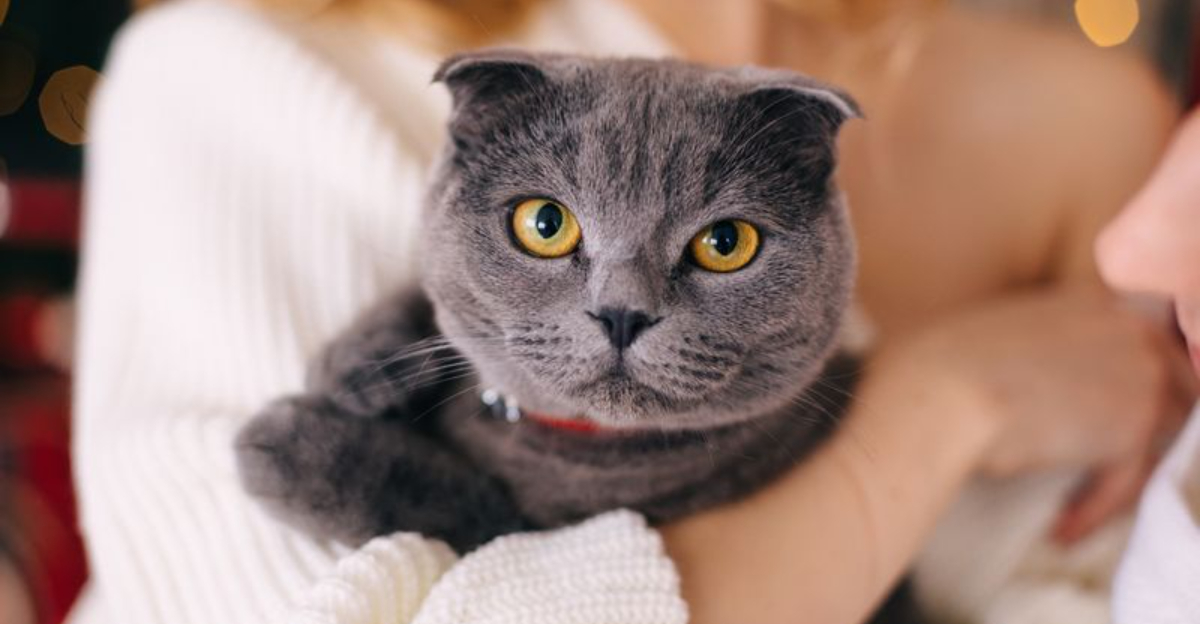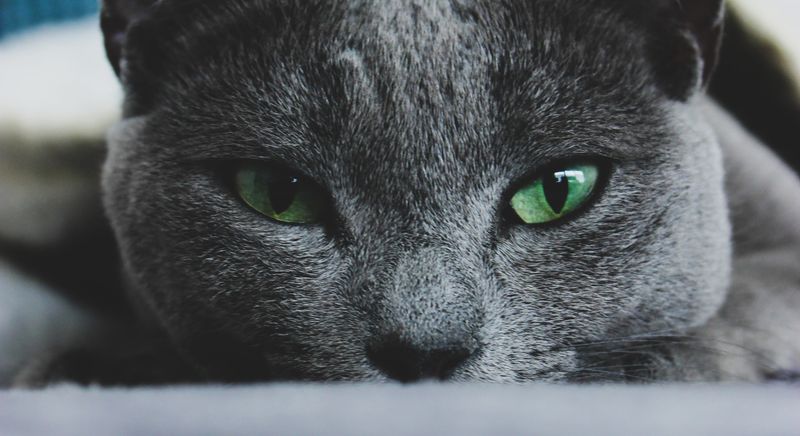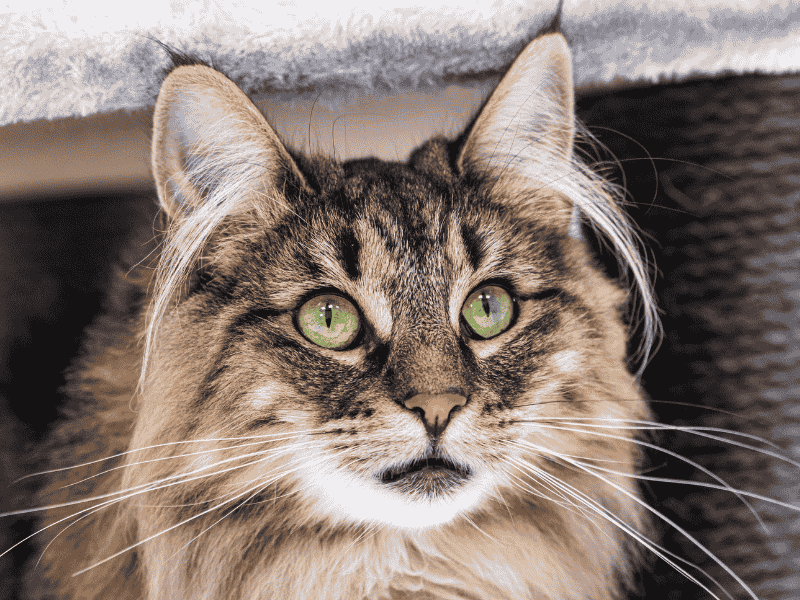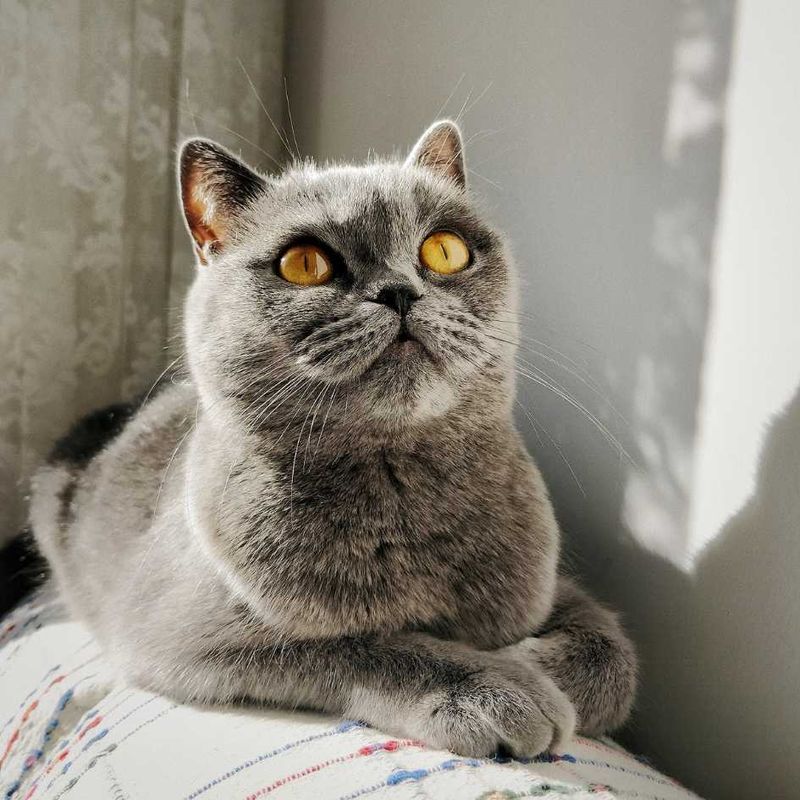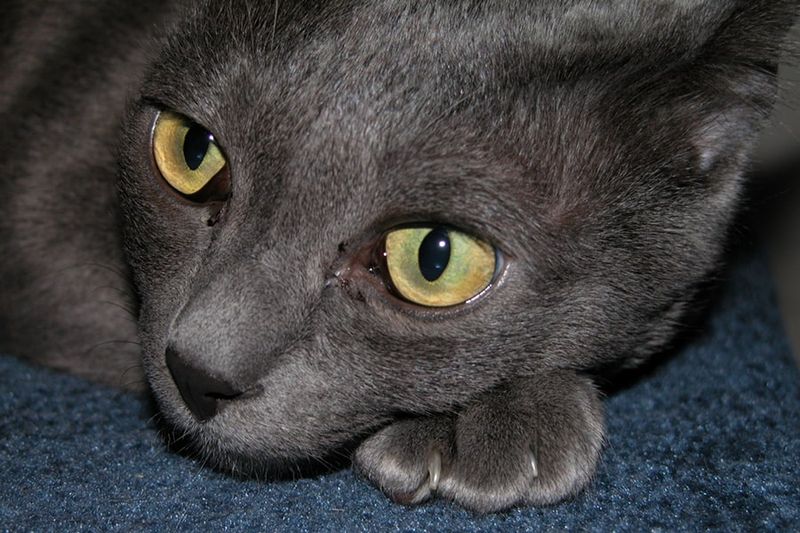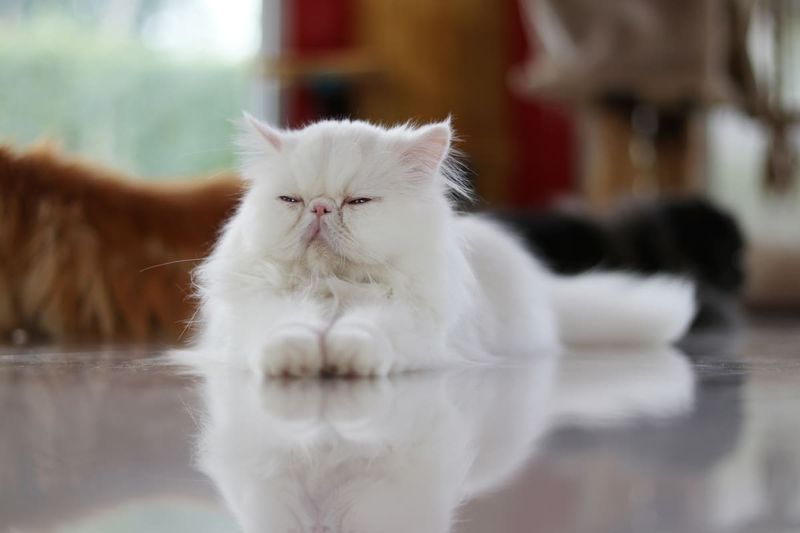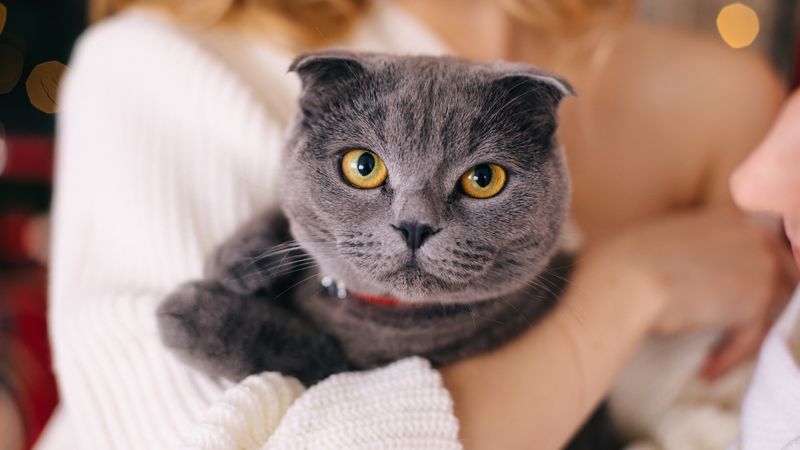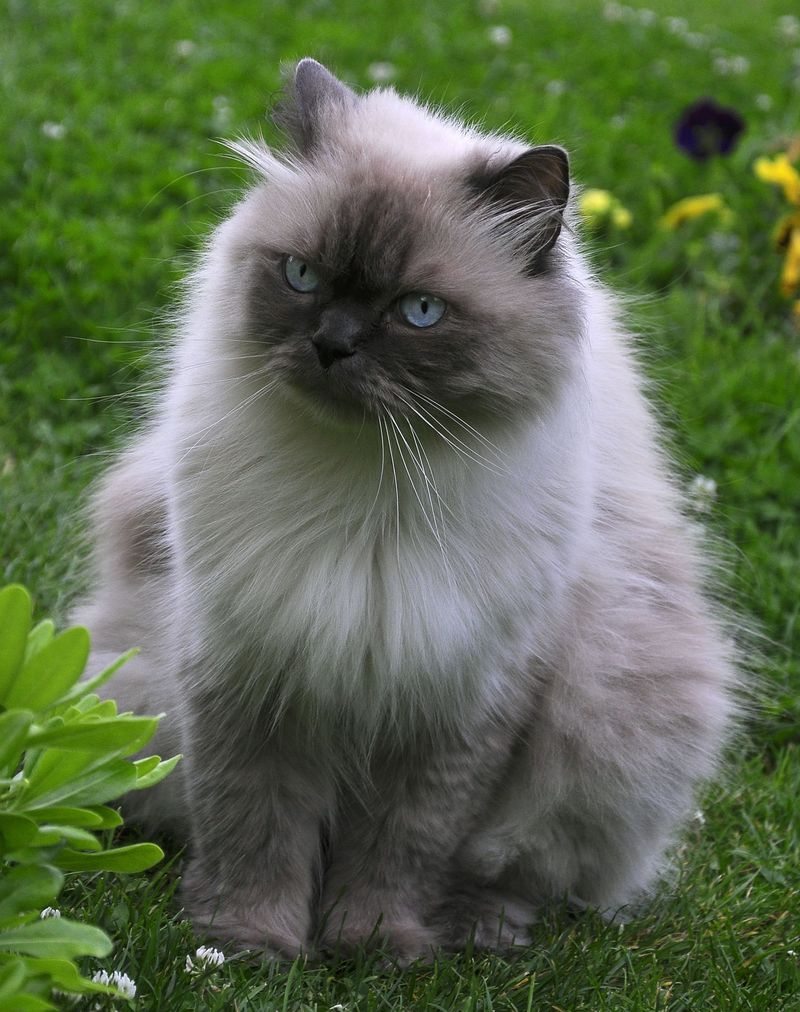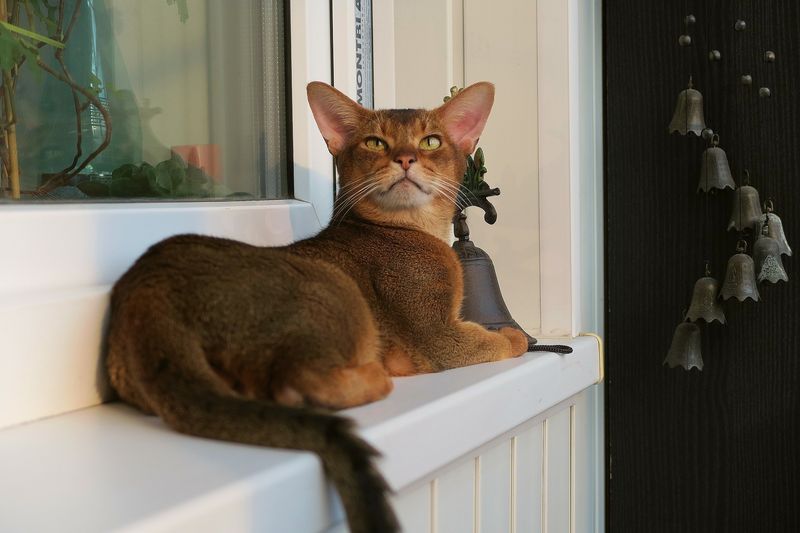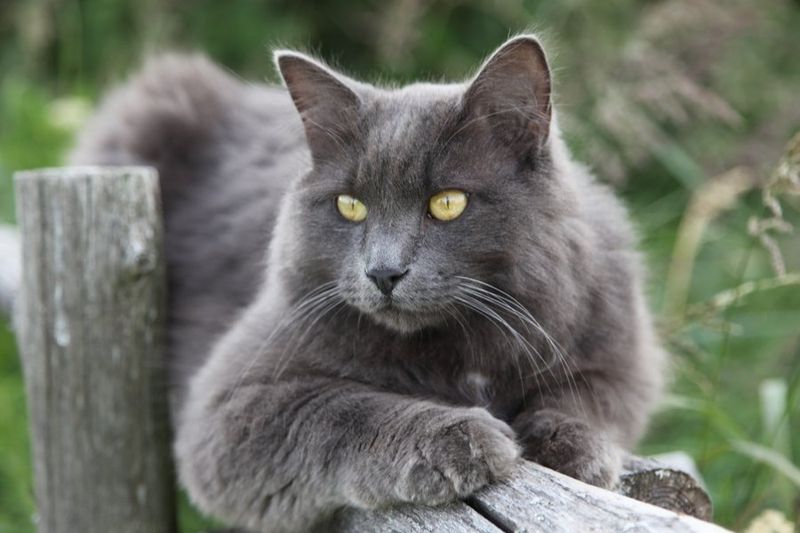📖 Table of Content:
Cats display a wide range of personalities, much like people do. Some enjoy constant activity and human interaction, while others are more reserved and sensitive to their surroundings. The environment plays a significant role in a cat’s comfort and overall well-being.
Busy households filled with children, guests, and noise can be stressful for certain cats. These cats may become anxious, withdrawn, or even display unwanted behaviors in response to overstimulation. A calm, predictable setting is often better suited to their temperament.
Certain breeds are known for their quiet, independent nature and preference for peaceful living spaces. These cats tend to form strong bonds with a few people rather than socializing widely. They are typically happiest in homes that offer a slower pace and minimal chaos.
1. Russian Blue
Russian Blues are known for their shy and reserved temperament. These elegant gray cats often hide when strangers visit and prefer quiet corners where they can observe without participating in family chaos. They form deep bonds with one or two people but may become stressed in homes with multiple children or frequent guests. Russian Blues need their personal space respected.
While affectionate with their chosen humans, these cats thrive in predictable routines and calm environments. The constant noise and unpredictability of large families can cause anxiety in these sensitive felines.
2. Norwegian Forest Cat
Despite their wild appearance, Norwegian Forest Cats are surprisingly sensitive souls. These majestic felines value their independence and personal space above all else. They become overwhelmed by constant attention demands from multiple family members.
Their natural instinct to retreat high up when stressed means they often seek elevated spots away from household commotion. Norwegian Forest Cats prefer homes where they can choose when to socialize. The unpredictable energy of children and the constant activity of large families can make these dignified cats withdraw or become anxious.
3. British Shorthair
If you have a busy household, a British Shorthair might not be the best fit. These cats are pretty laid-back but don’t handle chaos well. They’re not really into cuddling or being carried around, so they may not be the most tolerant around young kids.
British Shorthairs show affection through quiet companionship rather than playful interaction. Their independent nature means they need time alone to recharge. The constant stimulation of a large family can exhaust these dignified cats, causing them to retreat or become irritable.
4. Korat
Known for their loyalty, these silver-blue cats from Thailand form strong bonds with their primary caregiver but are often cautious around strangers. Sensitive to their surroundings, they can easily be startled by loud noises. A calm, peaceful environment suits them best, where gentle interaction replaces boisterous play.
Korats can become stressed in environments with unpredictable sounds and movements, making large family homes challenging for them. Their intelligence makes them aware of subtle changes in their environment. The constant coming and going of family members and guests can trigger anxiety in these perceptive felines who crave stability and calm.
5. Persian
Persians epitomize the laid-back, quiet cat personality. These long-haired beauties prefer serene environments where they can lounge undisturbed for hours. The constant movement and noise of large families can overwhelm their gentle sensibilities.
They dislike being handled excessively and may retreat when faced with too much attention. Persians aren’t naturally playful cats and prefer gentle petting sessions over energetic games that children often want to play. Their placid nature can be mistaken for tolerance, but these cats actually experience significant stress in chaotic environments. A Persian needs predictability and peace to truly thrive.
6. Scottish Fold
With their distinct folded ears, Scottish Folds may appear endlessly curious, but they’re actually quite sensitive to stress in their environment. These cats form deep connections with a few chosen people and can get anxious if their daily routine is upset. Loud noises and sudden movements—common in homes with young children—are things they typically dislike.
Scottish Folds prefer gentle interaction and can become withdrawn if overwhelmed by too much handling or attention. Their moderate energy levels mean they tire quickly from play and need plenty of quiet time to recharge. The constant stimulation of a large family home rarely allows for the peaceful periods these cats require.
7. Himalayan
Himalayans combine Persian gentleness with Siamese sensitivity, creating a cat that requires significant personal space. These stunning cats become easily overwhelmed by household chaos and prefer consistent, quiet routines. They typically bond with one or two family members rather than the entire household. Himalayans dislike being picked up frequently or handled by multiple people, making them poor matches for homes with several children.
Their long, luxurious coats require regular grooming sessions that need to happen in calm environments. The unpredictable nature of large family households rarely provides the peaceful atmosphere these dignified cats need to feel secure.
8. Abyssinian
Although Abyssinians are active cats, they’re surprisingly in tune with the emotional atmosphere of their surroundings. These intelligent cats can become stressed in environments that are unpredictable or marked by family conflict. Instead of joining in on group activities, they prefer calm, focused play with one person at a time.
Abyssinians need mental stimulation, but in controlled settings, not the random commotion typical of large families. Their alert, watchful nature means they’re constantly processing their surroundings. The sensory overload of a busy household with multiple people talking, moving, and making noise can overwhelm these perceptive cats, leading to anxiety and behavior problems.
9. Nebelung
As one of the most reserved cat breeds, Nebelungs are naturally shy and cautious. These rare blue-gray longhairs can take a long time to trust their own family, and visitors may never gain their comfort. Their sensitivity to loud noises and abrupt movements makes them less suited to households with a lot of activity.
Nebelungs form deep bonds with quiet, patient people who respect their need for personal space and gentle handling. Their timid nature means they often hide when feeling overwhelmed. The constant activity and unpredictability of life with multiple family members can prevent these sensitive cats from ever fully relaxing and showing their true loving personality.
